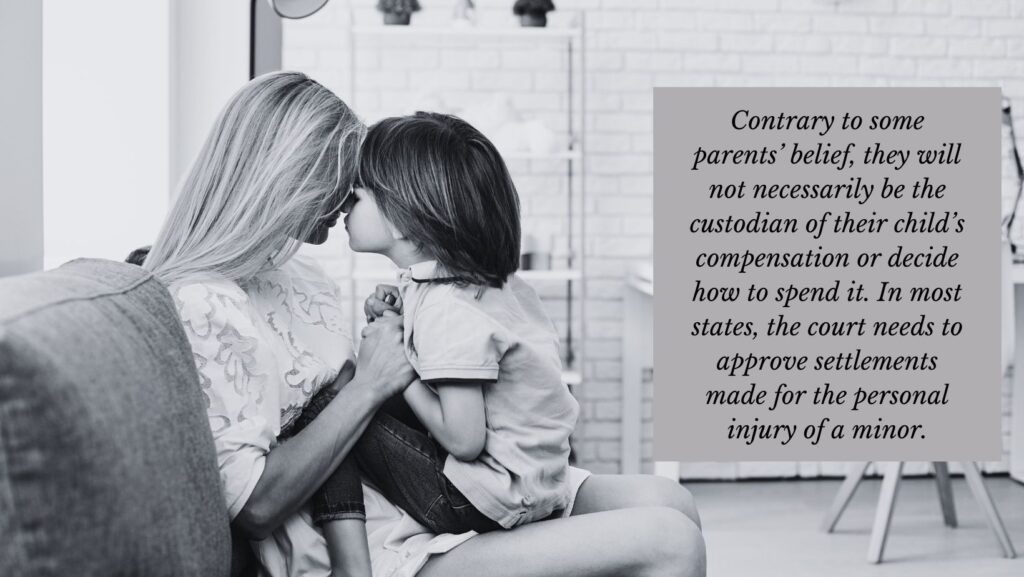When a child is harmed due to someone else’s negligence, it can be upsetting and even life-changing for the entire family. Parents want to see their child make a full recovery—something that takes time and can put a strain on the family budget. A minor has the same rights to compensation as an adult, but the legal landscape is complex because children have no legal standing to file a claim or lawsuit. Instead, it is up to the parent or guardian to file a personal injury claim on behalf of a child.
 Image by Pavel Danilyuk by Canva.com
Image by Pavel Danilyuk by Canva.com
There are special rules for personal injury cases that involve minors. These are in place to protect the interests of the child and to ensure that those caring for them have the resources they need to do so. Due to the complicated nature of these cases, hiring an attorney will help.
Causes of Child Personal Injury
Personal injury of a minor can happen in a number of ways. Car accidents are one of the most common. Despite strict child safety laws requiring car seats, boosters, and seat belts, a child is hurt in a passenger vehicle crash on average every 25 seconds according to Forbes.
Other incidents, like dog bites, slipping and falling, or being hit by a car while walking or riding a bike can also result in injuries. These range in severity from bumps and bruises to something more serious. Many children end up in the emergency room for stitches or a cast, and need follow-up care. The worst cases can result in permanent disability requiring long-term care, or even death.
If a child is hurt due to someone else’s negligence or carelessness, the negligent party is responsible for caring for that child’s injuries. The at-fault driver or dog owner (and their insurance company) is financially liable. Accidents that happen in public places such as stores, elevators, swimming pools, or amusement parks are a matter of premises liability. The responsibility falls on the owner or manager of the place where the accident happened.
Who Can Bring a Personal Injury Claim on Behalf Of a Child?
Because a minor has no legal standing, the child’s parent or legal guardian must file a claim for compensation after an injury. If no one does it for them, the child is allowed to file their own claim once they turn 18 even if the accident happened years before. (More on this below in the Statutes of Limitation section.)
Who Will Manage a Minor’s Compensation?
Contrary to some parents’ belief, they will not necessarily be the custodian of their child’s compensation or decide how to spend it. In most states, the court needs to approve settlements made for the personal injury of a minor. This is done with the help of a court-appointed guardian ad litem (GAL) who works with both sides of the case to negotiate the terms of the settlement. The GAL’s and the court’s job is to protect the child’s interests by making sure any damages go to the child for their physical and emotional recovery.
In addition to approving the amount and terms of the settlement, the judge will sign off on the type of account (usually a trust fund or annuity) to hold the money for the minor until they turn 18. In the meantime, the parents can petition the court to withdraw money from the account to pay for the child’s medical care or expenses that directly benefit them, such as tuition.
It is worth noting, though, that settlement money must be reported as income. Depending on how a settlement is structured, withdrawing funds for college could compromise financial aid eligibility. Hiring an attorney with experience in claims for children will ensure that all agreements are written in such a way that they do not interfere with the child’s future plans.
 Image by studioroman by Canva.com
Image by studioroman by Canva.com
Settlement Rules in New Mexico
New Mexico child personal injury cases are slightly different, as they can be settled without a judge’s consent. Most insurance companies, however, insist on court approval before agreeing on a payout. The parent or guardian can submit paperwork to request settlement approval or file a civil lawsuit. From there, a New Mexico case proceeds like any other, with the appointment of a GAL to negotiate the amount and terms of the settlement, followed by the judge’s authorization.
Settlement Rules in Texas
Cases in Texas add another requirement to approving settlements for minors. Texas judges look at the plaintiff’s attorney’s fees. If they are more than the attorney would normally charge an adult, the judge can intervene and have them lowered.
Just as when an adult in any state accepts a settlement, once a child’s settlement in New Mexico or Texas is approved by the court system, it is final. The child or their guardian can not go back for additional funds at a later date.
Proving Liability in a Child Personal Injury Case
To prove liability in any accident, whether a child is involved or not, the victim or their representative must be able to demonstrate the following:
- The defendant had a duty of care.
- Negligence of the defendant caused the incident.
- The plaintiff’s injuries were the direct result of the incident.
Adult cases can factor in comparative negligence if the victim was partially responsible for the accident. This divides up the blame—and the settlement—between both drivers in a car accident, or the shopper and store owner in a slip and fall. For example, if the victim was 10% to blame, they would only receive 90% of the settlement amount.
Minors, however, are not subject to comparative negligence rules. Children—particularly young children—may not understand the risks of actions that might contribute to them getting hurt the way a grown-up would.
An accident is never a child’s fault, even if they did something to help it happen. For example, they will not share the blame if they are hurt while chasing a ball into oncoming traffic, wandering into a construction site, or opening a gate that keeps in the neighbor’s aggressive dog.
Compensation for the Personal Injury of a Minor
Just like an adult, children are eligible for damages that include all medical expenses for their injuries. Due to a child’s small stature, even a fender-bender can cause more physical harm than it might for someone bigger.
Victims may also receive non-compensatory damages such as pain and suffering, emotional distress, and loss of quality of life. And even though a child’s future potential is uncertain, economists and financial professionals may be consulted to estimate the victim’s future economic losses due to a permanent disability.
Determining an accurate total for both current and future damages is crucial, especially if the injuries will affect the rest of the child’s life. Kane Personal Injury attorneys have experience in making these calculations to maximize compensation.
Statute of Limitations
While the statute of limitations for adults is three years in New Mexico and two years in Texas, it is different when a minor is involved.
In New Mexico, a parent or guardian has three years to file a personal injury claim on behalf of a child. If they fail to do so, the statute is “tolled” or paused, until the child’s 18th birthday, at which time they can file a claim themselves. However, a new deadline of only one year kicks in at that time. They must file by their 19th birthday.
Texas gives parents and guardians the standard two-year statute of limitations that it gives to all personal injury cases. It too tolls unfiled claims until the child turns 18. At that time, the “clock” starts again on the two-year statute, expiring on the day the victim turns 20.
An exception to state statutes of limitation is when an accident happens on government property, such as at a school or a park. Government agencies may have immunity from liability for certain types of incidents. For example, if a child breaks their arm on the playground outside of school hours, they may have no claim. The mandatory time periods to file a claim may differ by state and municipality. If a child is hurt at school or in any government-owned location, it is best to contact an attorney who can sort out the rules and the child’s rights to compensation.
Even though a child can eventually file their own claim, it makes sense for a parent or guardian to do it on their behalf as soon as possible. This way there is no chance of missing the statute deadlines, and it allows for the collection of much-needed funds sooner rather than later.
What to Do When a Minor is Injured
As with any accident, it is important to get an injured child medical help immediately. Keep all records to establish the facts of the case and to calculate reimbursement amounts.
In order to protect the child’s best interests, it is best not to let them talk to anyone other than the police and medical professionals. The at-fault party and their insurance company should deal directly with the parent or guardian, or better yet, an attorney.
If a child in your care has been hurt in a car accident, slip and fall, or dog bite incident, contact Kane Personal Injury for a consultation. We’ll put our experience with all types of personal injury cases to work for your child’s recovery and future well-being.
Please note that this article was created for advertisement purposes, and it does not constitute any contractual legal relationship, nor imply one.
